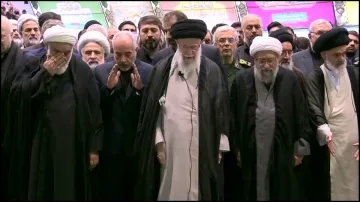Iran's Supreme Leader Ayatollah Ali Khamenei offers prayers at Raisi's funeral service | WATCH
Raisi, his foreign minister and others were killed when his helicopter crashed in poor weather in the mountains in East Azerbaijan province. His body was taken on a procession through downtown Tehran to Azadi on Wednesday, also known as "Freedom Square", where Raisi gave speeches in the past.

Tehran: Iran's Supreme Leader Ayatollah Ali Khamenei performed prayers in Tehran on Wednesday ahead of the funeral of President Ebrahim Raisi, foreign minister Hossein Amir-Abdollahian and their companions, who died in a helicopter crash near the Azerbaijan border at the weekend. Thousands of Iranians wore black and held photos of the late President at the prayers in Iran's capital.
The service began at Tehran University as the caskets of the deceased officials draped in Iranian flags arrived. A black turban was placed at the late Raisi's coffin, signifying his direct descendance from Islam's Prophet Mohammad.
“Oh Allah, we didn't see anything but good from him,” Khamenei said in the standard prayer for the dead in Arabic, the language of Islam's holy book, the Quran. He soon left and the crowd inside rushed to the front, reaching out to touch the coffins. Iran's acting president, Mohammad Mokhber, stood nearby and openly wept during the service. Top leaders of Iran's paramilitary Revolutionary Guard, and Hamas politburo chief Ismail Haniyeh also attended the funeral service.
Hamas is the militant group that Iran has armed and supported during the ongoing Israel-Hamas war raging in the Gaza Strip. Before the funeral, an emcee led the crowd in the chant: “Death to Israel!” Haniyeh said he had come in the Palestinian people and the "resistance factions" of Gaza to offer condolences on Raisi's tragic demise. He also recounted meeting Raisi in Tehran during Ramadan, the holy Muslim fasting month, and heard the president say the Palestinian issue remains the key one of the Muslim world.
Pakistan PM expected to attend Raisi's funeral service
Raisi's body was flown from Tabriz, the closest major city to the remote crash site, to Tehran airport before heading to the holy Shi'ite Muslim city of Qom. His body was taken on a procession through downtown Tehran to Azadi, also known as "Freedom Square", where Raisi gave speeches in the past. People carried the coffins out on their shoulders, with chants outside of "Death to America!
Pakistan's Prime Minister Shehbaz Sharif and a delegation from the Taliban of Afghanistan, including their Foreign Minister Amir Khan Mutaqqi, were expected to attend Raisi's service. Even Egyptian Foreign Minister Sameh Shoukry travelled to Tehran, despite diplomatic relations between the countries being severed after the 1979 revolution.
Iran's theocracy declared five days of mourning over Sunday's crash, encouraging people to attend the public mourning sessions. Typically, government employees and schoolchildren attend such events en masse, while others take part out of patriotism, curiosity or to witness historic events.
Raisi's death causes stir in Iran
Raisi, a hardliner seen as a potential successor to Supreme Leader Ayatollah Ali Khamenei, was killed when his helicopter crashed in poor weather in the mountains, officials and state media said on Monday. The death of the president came at a time of deepening crisis between the clerical leadership and society at large over issues from tightening social and political controls to economic hardship. Raisi's body will return to the capital to lie at Tehran's Grand Mosalla Mosque before being transferred to his hometown of Mashhad, in eastern Iran, for burial on Thursday (May 23).
The events are a government-led series of ceremonies aimed at both honouring the dead and projecting strength in an unsettled Middle East. For Iran's Shiite theocracy, mass demonstrations have been crucial since millions thronged the streets of Tehran to welcome Grand Ayatollah Ruhollah Khomeini in 1979 during the Islamic Revolution and also attended his funeral 10 years later.
However, Raisi's death was met by a muted atmosphere that revealed little of the spectacular public grief that has accompanied the deaths of other senior figures in the Islamic Republic's 45-year history. Most shops remained open and the authorities made little effort to interrupt ordinary life as government loyalists packed into mosques to pray for the deceased President and foreign minister.
More than a year after Raisi's hardline government cracked down violently to end the biggest anti-establishment demonstrations since the 1979 revolution, opponents even posted furtive videos online of people passing out sweets to celebrate his death. Prosecutors already have warned people over showing any public signs of celebrating his death and a heavy security force presence has been seen on the streets of Tehran since the crash.
(with inputs from agencies)
ALSO READ | Norway, Spain follow Ireland's move to recognise Palestinian statehood, Israel recalls ambassadors